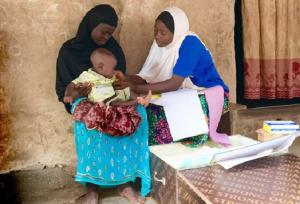Remote Nigeria communities welcome child health programme
Integrated community case management (iCCM) is a cost-effective strategy that engages community health workers living in hard-to-reach areas to diagnose and treat 3 deadly but curable illnesses: malaria, pneumonia and diarrhoea.
We have travelled for over 2 hours from Minna in Nigeria’s rural Niger State. The final 45 minutes are on unpaved roads, and we exchange nods and waves as our jostling four-wheel drive vehicle passes people walking or tending to crops. Coming to a field ringed with trees, we exit the vehicles to walk down a precipitous trail leading to the village of Etsu Gudu.
Naumi, a community educator, offers a hand when someone stumbles on the steep path. She recounts how women have given birth on the mountainside, unable to complete the ascent while in labour. Still other women leave home for up to a month before giving birth, so they can be nearer to a health facility.
This is the reality, amidst the beauty and serenity of the pastoral landscape. There is plentiful water from the river that passes next to the village – enough for puddles that attract mosquitos. There are hills that insulate the community. There are plots of land for growing bananas, palm and kola nuts, food that supports the subsistence needs of the village’s 300 inhabitants. Children find playmates outside the door of almost every single-room house. And a school stands at the edge of the clearing where we find Mohammed El Hadj, the village head.



